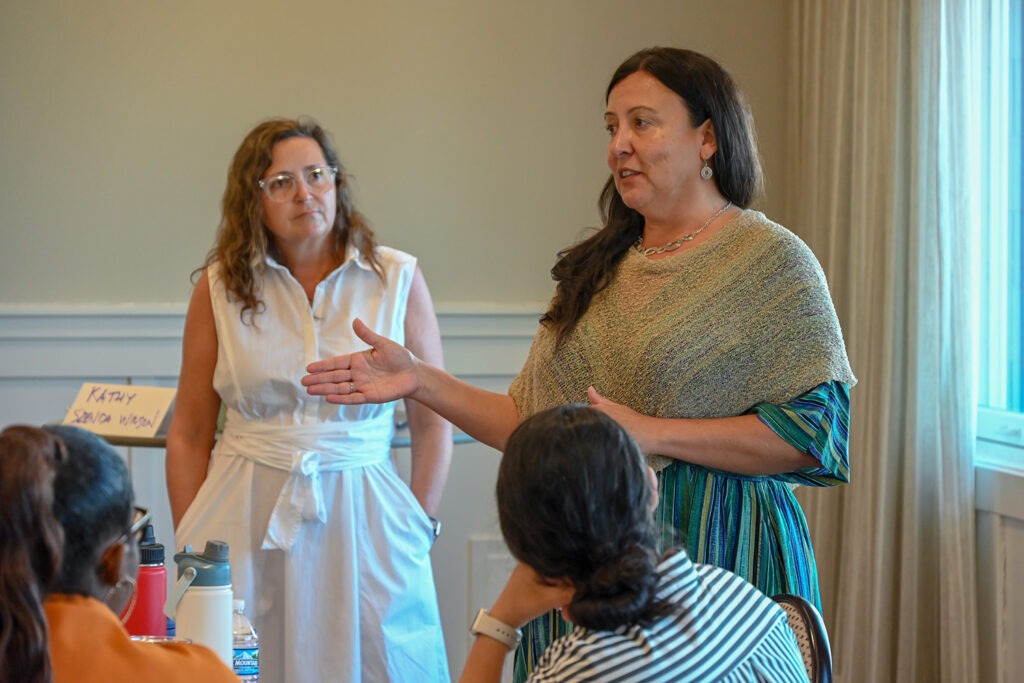Change agents are implementing new strategies at local, regional and statewide levels
BENTON HARBOR, Mich. – Along the shore of Lake Michigan, a cross-sector of stakeholders gathered for a two-day conference to strategize how to implement change in their communities.
The primary goal of the meeting was to build a stronger early learning and care system in southwest Michigan, recognizing the vital roles that the public, private and nonprofit sectors each play in creating systemic change for families and communities through policy change and advocacy.
Battle Creek-based W.K. Kellogg Foundation (WKKF) grantee Pulse, a systems change organization and a project of the W.E. Upjohn Institute for Employment Research, facilitated the training of the group, known as the Southwest Michigan Childcare Coalition. The coalition consisted of representatives from seven counties – Berrien, Branch, Calhoun, Cass, Kalamazoo, St. Joseph and Van Buren – each of whom was armed with a regional plan that provides a framework for implementing change in a holistic way that meets the unique needs of each community.
Kathy Szenda Wilson, founder and co-executive director of Pulse, said the aim of the training was to build a collective effort, where members of the implementation team could utilize the regional plan to bring change to their communities, whether they be urban, suburban or rural.
“We’re better together. We need to come together and realize what each of us bring to the table,” Szenda Wilson said. “We need to give them the system they need to operate in. In our approach with the regional plan, we know how to do this. We just have to get the right people in the room talking about the system itself, from all the different perspectives and sectors. We need to identify how the system needs to change to get better outcomes, and then we need to support those people that do the work… They have a huge role in this. We all do.”

Photo credit: Nick J. Buckley
A PLAN FOR PROGRESS
In 2023, Pulse was one of 16 organizations around Michigan to receive $150,000 in Regional Child Care Planning Grants from the Early Childhood Investment Corporation’s (ECIC) Child Care Innovation Fund through the Caring for MI Future Initiative. The funding supports the study of early learning and care within each region, with a goal of expanding child care options to increase access and lower costs to families.
Following an expansive survey, Pulse engaged with a cross-sector of representatives from the child care landscape and assembled a steering committee – including representatives from both the public and private sectors, such as families, municipalities, funders, employers, child care business owners, policy makers, workforce developers and economic developers – to create Southwest Michigan’s Comprehensive Childcare Plan.
The plan addresses the complex and pressing issues that have created a broken early learning and care system, which includes a lack of access and affordability for high quality early childhood care and education, and the low wages for child care professionals which have resulted in an unstable workforce.

Photo credit: Nick J. Buckley
“Despite impressive local efforts to support the early childhood system and sector, barriers still exist — such as appropriate compensation for the early learning and care workforce — preventing families and children from accessing needed early learning and care opportunities,” said Megan Russell Johnson, program officer for WKKF and a member of the steering committee. “Addressing these barriers requires us to engage in a more regional and statewide approach that targets broader systems level changes that can better support along with local efforts. The current context creates an excellent opportunity to create a more aligned system that will expand equitable access to high-quality early learning and care, supporting families and caregivers and bolstering our local and regional economies.”
The pandemic exacerbated preexisting flaws in early learning and care. Following the outbreak, many child care providers were forced to close or scale back operations, and families were left with tough decisions about child care, particularly those with children in the critical range from birth through age 5.
Among the silver linings of the pandemic was that it opened some eyes and caused a shift for people and organizations to radically rethink and invest in the early learning and care ecosystem. For the private sector, there has been a growing acknowledgement that a lack of affordable and accessible child care impacts talent attraction and retention and hinders productivity for working families.
Bronwyn Drost, senior director of economic development and retention for Southwest Michigan First and a member of the steering committee, said the pandemic exposed a broken early learning and care system and forced business leaders and economic developers to see child care as both a workforce and economic issue.
“It’s an interesting shift that has been happening for several years, and the pandemic accelerated it to a degree because of the ‘Great Resignation’ and other phenomena like that,” Drost said. “And we started hearing back that (employers) were concerned with housing and child care, two things that weren’t really on the radar of economic developers or business leaders from Michigan.
“It was fascinating, from my perspective, to recognize that now corporations care about child care and there was that simultaneous uprising of resources and acknowledgement that we really need to invest in the well-being of our children, from cradle to career and everything beyond that.”
RESHAPING THE SYSTEM IN BATTLE CREEK
Pulse, known originally as BC Pulse, launched in 2012 to support systems change in Battle Creek (population 52,721). The organization doesn’t do any direct programming, instead providing the slack for organizations to think systemically with the aim of a more coordinated, aligned, equitable system of supports for families.
In coordination with community stakeholders across both public and private sectors, including the city of Battle Creek, Calhoun County Public Health Department, Calhoun Intermediate School District (CISD), Battle Creek Public Schools, Community Action of South Central Michigan, Southwest Childcare Resources, Grace Health, United Way, WKKF and a number of grassroots organizations and others in the early learning and care space, the city has made notable gains in preparing children for kindergarten.
In a 12-year span, kindergarten readiness has tripled for students entering Battle Creek Public Schools in the fall, with an increase from 15% to 54% (reading and mathematics combined) based on the Northwest Evaluation Association (NWEA) Measures and Academic Progress (MAP) assessments, a standardized test that measures a student’s academic achievement and growth. This improvement came in spite of Battle Creek having a childhood poverty rate more than twice the national average.
Much like with the child care crisis, there is no singular solution to improving kindergarten readiness in Battle Creek, but instead a myriad of factors that resulted in a sizeable shift. The progress has been due in large part to forging new relationships and strengthening existing ones, along with the flexibility and willingness to adapt.

Photo credit: Nick J. Buckley
“The conditions we created allowed for our program people to do their programming in a coordinated, aligned and equitable way,” Szenda Wilson said. “We brought some knowledge in so there is a framework for this change. It’s an adaptable, iterative framework. It’s an art, not a science.”
Marcie Gillette, community services director for the city of Battle Creek and a member of the steering committee, has worked with Pulse to help the municipality better understand its role in the early learning and care ecosystem and areas where it can be uplifted.
“Our city administration recognized that we have an economic piece to this work. If we are going to have a healthy community, we need to have services available for residents of our community,” Gillette said. “As it relates to funding from the city, we’ve always funded community development work, but never intentionally early child care… For us to invest dollars that are streamlined to only benefit a smaller population of our residents is a little bit different approach. But we recognize that while there’s that benefit of service delivery that maybe is smaller, it really impacts a much broader, greater overall community health need.”
Gillette added that the city helped remove barriers simply through a do-no-harm approach by adapting the special use permit process for child care businesses, which had previously been “rubber stamped” with a $600 fee for providers, an unnecessary burden given the permits were essentially approved automatically.
“If we are allowing these (permits) in all these places, we know it’s a betterment for the community, why are we requiring them to work through a process that takes time and money?” Gillette said. “We’re allowing them anyway. Why are we rubber stamping and having them go through red tape? Everywhere in the community, we want neighborhood at-home care and also facilities. So, let’s just make them allowed by right, in all zoning areas.”
In Battle Creek, Northern Initiatives is a Community Development Financial Institution (CDFI), a lender active in minority communities and areas of persistent poverty. Israel Flores, business services director for Northern Initiatives, said the organization is exploring opportunities to support current and prospective child care providers in Battle Creek through business training and funding.
“We want to create opportunity for community members who are planning or thinking about opening a child care center or business, and we want to make sure that they have the tools to make it happen,” Flores said. “We have to invest in the people who are helping these little kids, because they’re the future of the country. They are going to drive the country, the economy, everything. And I think we need to be smart and invest in them.”
Like all communities, Battle Creek has unique resources and significant challenges in its continued effort to make incremental changes to the early learning and care ecosystem. Even so, the community-level approach to changing that system can only go so far.
“For the last dozen years, we’ve had this honor, privilege and responsibility to do this work on behalf of the people of Battle Creek and now beyond,” Szenda Wilson said. “We’ve gone almost as far as we can in Battle Creek, systemically. The changes that need to be made now are more regional, state and federal. We need to take this model and orientation and the work beyond the borders here.”
A TIME TO ‘THINK DIFFERENTLY’
Taneka Thomas has worked with Pulse through her professional experience in both the early learning and care sector and workforce development. The founder and CEO of Empower Coaching & Career is launching a nonprofit early learning and care center located at a former elementary school building in her hometown of Albion, adding much-needed capacity for the city of 7,600 located in Calhoun County.
Thomas said Families First Learning Center will provide wraparound services using a two-generation or whole family approach, offering “accessible, affordable and high-quality care” with fair wages and built in support for staff to further careers as early childhood educators.
Despite an extensive background in early child development, established relationships and experience navigating bureaucratic systems, Thomas said she has still experienced a number of “random” roadblocks that have delayed the opening date for the new center.

Photo credit: Nick J. Buckley
“Sometimes it’s little things, like submitting information (for grants), but not knowing who to submit it to,” Thomas said. “Then you get to licensing, who is my license person? All these little things that add up.”
Thomas shared that Families First Learning Center received a $25,000 grant for furnishings and supplies, but it was no longer needed for that purpose after a center in a neighboring community closed and donated all of its equipment. The grant stipulations won’t allow Thomas to repurpose the funds to help pay for wages, saying it illustrates the need for funders to offer built-in flexibility with funding and to think creatively to help remove barriers.
“When it comes to funders, you’ve got to think differently,” Thomas said. “With me starting up, let’s look at the working capital side of it… How do I recruit families if I don’t have the staff? I have $25,000 for supplies, but can’t use it for wages. How do I get the working capital so that I can recruit, because before we start programs, I need to pay staff for training.
“Let’s show them something different,” Thomas continued. “We need to transform these systems to something that is beneficial and sustainable for the whole family and the community. If the family is sustained, the community is sustained. Until we break that cycle, we’re going to be doing the same stuff.”
SEEDS OF CHANGE THROUGHOUT MICHIGAN
Understanding that policies and systems play critical roles in shaping children’s lives, Pulse has expanded the scope of its work while leveraging its connections in Battle Creek.
The organization has been contracted to host “CEO Summits” around Michigan, which emphasize the need for business leaders to better understand the child care crisis, using the tagline, “When Early Childhood Works, We All Work.”
“We heard a lot of folks from the business sector saying, ‘We need more childcare slots. Let’s build a childcare center.’ And that’s what their answer was, but they wanted somebody else to do it,” said Maria Ortiz Borden, co-director of Pulse. “That’s what tends to happen… Our approach really is, ‘What is your role in this?’ So the CEO summits really became part of getting them to recognize what their role was in solving this community problem or community crisis, and getting them to say, ‘I do have a role to play. What am I going to do? What can I do?’ And we help them identify what they could do, and then support them in that process.”
Andy Richards, Executive Vice President and Chief Operating Officer at Duncan Aviation Battle Creek, has served as a “child care champion” at the CEO summits, imploring fellow business leaders to invest in solutions to the child care crisis.
Richards, along with Szenda Wilson, testified at a joint hearing of Michigan’s Labor and Economic Opportunity Appropriations Committee and the Michigan House of Representatives Labor Committee on the issue of the child care crisis and its impact on labor in March of 2024.
“The lack of reliable, high-quality child care in our local area prevents many would-be job seekers from entering or re-entering the workforce after they have started a family,” Richards testified. “In addition, those current team members with young families may not be able to fully engage and focus while they are at work if they are constantly worried about who is taking care of their young kids. It can be a matter of productivity loss due to distracted workers making excessive mistakes while on the job or being unexpectedly absent from work due to child care that falls through at the last minute.”
The CEO summits demonstrated that business leaders were increasingly receptive to creating better conditions for working families to thrive in the workplace. As a result, Pulse developed an “employer roadmap” to share with corporate partners, offering insight into the best options for addressing the early learning and care needs of a workforce that were respectful of family choice, including flexible scheduling; employee assistance or employee resource programs; backup care; vouchers, subsidies and dependent care; onsite care; and public advocacy.

Photo credit: Nick J. Buckley
As with the employer roadmap, Pulse has developed a “municipal roadmap” as a tool for communities to think boldly and strategically about how to enact change through layered approaches.
“Municipalities and workforce development organizations as well – we need more people working in the (early learning and care) field,” Drost said. “It’s a multipronged approach. To have us all in the same room convening on a regular basis to talk about this had immense value because we all learned from one another.”
In assembling the Southwest Michigan Child Care Coalition and developing Southwest Michigan’s Comprehensive Childcare Plan, Pulse is not aiming to replicate what worked in Battle Creek or elsewhere, but to inspire regions to be innovative in meeting the unique needs of each community and promote advocacy for policy change and funding at the state level.
Beth Berglin, director of policy and strategy for the Michigan Transformation Collective, served as the implementation lead for Kalamazoo County, and said that being part of the coalition has been empowering.
“Bringing community together to meet our own needs is one of our core values,” Berglin said. “It’s the belief that the people in the community have the answers, and we have to create the container in which that can be successful. Because of the relationships and the ability to take state policy and embed it in local change and having the support of Pulse in the regional aspect, it’s an authorization that doesn’t exist otherwise.”
Russell Johnson added that the regional approach to reshaping the early learning and care system is good for Michigan’s communities, businesses and families, “but let’s never lose focus that we do this work because it is what is best for kids.”
####
LINKS
Southwest Michigan’s Comprehensive Early Child Care Plan (Pulse 2024)







Comments